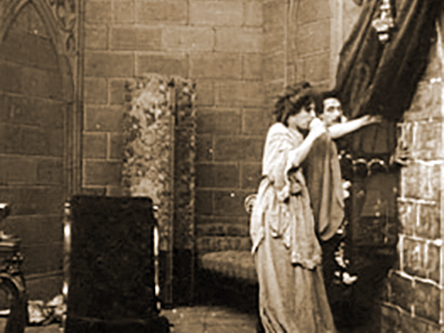| |
 |
| |
Marion Leonard and Henry B. Walthall.
Frame enlargement: Silent Era image collection.
|
The Sealed Room
(1909) United States of America
B&W : Split-reel / 779 feet
Directed by D.W. Griffith
Cast: Arthur V. Johnson [the king], Marion Leonard [his favored one], Henry B. Walthall [the minstrel, her secret lover], Owen Moore [a nobleman of the court], William J. Butler [a nobleman of the court], George Siegmann [a nobleman of the court], Verner Clarges [a nobleman of the court], George O. Nicholls [a mason], Anthony O’Sullivan [a mason], Mary Pickford [a lady-in-waiting], Gertrude Robinson [a lady-in-waiting], Linda Arvidson [a lady-in-waiting], Mack Sennett [a soldier]
Biograph Company production; distributed by Biograph Company. / From the short story “La Grande Bretêche” by Honoré de Balzac. Cinematography by G.W. Bitzer. / © 3 September 1909 by Biograph Company [J131224]. Released 2 September 1909; in a split-reel with The Little Darling (1909). / Standard 35mm spherical 1.33:1 format. / The production was shot on 22-23 July 1909 in the Biograph New York studio.
Drama: Historical.
Synopsis: [Biograph Bulletin, number 271, 2 September 1909, page ?] There is scarcely a palace, castle or chateau in all Europe over whose crumbling ruins there does not hang the specter of some legend or mystery, but none are as intensely thrilling as the inspiration of this Biograph subject. Centuries ago, during the devastation of one of these castle, built in medieval times, a walled-up room was found to contain the skeletons of two bodies. Many theories were conjured, but the one adopted as the theme of this story seems the most logical. The King is so deeply in love with his favored one that he contrives a sequestered dove-cote for themselves by sealing up a room in the tower, leaving but one entrance open. The room is finished and dedicated with pomp and ceremony. During these festivities, however, the King becomes suspicious of the attentions shown an Italian troubadour by his favored one, so plans to surprise them in order to convince himself. To this end, a guard enters with a bogus order calling the King away for a time. The room cleared, the lady and the troubadour declare their mutual love, and she picking up the hour-glass intimates that they may enjoy each other’s society for at least the hour. The troubadour pours out his soul’s devotion in song, while the lady taking the rose allows the leaves to fall in time with dropping sands of the glass. While they are thus occupied the King returns; his fears are verified, and calling the masons, orders them to seal up only the entrance. The love song of the troubadour has now, unknown to the couple, become a dirge. As the last grain of sand drops to the botton bowl of the glass, the lovers make their way to the door only to be confronted with a cold, immovable wall of stone. Like a flash, the horror of the situation besieges them and they realize their fate. Their cries and beating on the walls are answered only by the taunts of the King, who stands outside in fiendish satisfaction of the terrible punishment he has meted out for them. Slowly the torturing oppression of the air-tight room overcomes them, which death only can relieve. In this production the Biograph has attained the very acme of motion picture art — most beautifully staged and costumed, and acted in a manner infinitely more convincing than anything ever before attempted. • Additional synopsis available in Usai-Griffith-3 p. 24.
Survival status: Prints exist the Museum of Modern Art film archive [35mm acetate fine-grain preservation master negative]; and in the Library of Congress film archive (paper print collection) [35mm paper positive].
Current rights holder: Public domain [USA].
Keywords: Affairs - Betrayal - Chairs - Draperies - Flowers - Garlands - Masonry - Musicians: Minstrels - Royalty: Kings - Suffocation - Trowels - Walking sticks - Weapons: Guns, Swords - Workers
Listing updated: 15 October 2011.
References: Film viewing : Barry-Griffith p. 41; Everson-American p. 48; Eyman-Pickford p. 324; Niver-Early p. 290; Spehr-American p. 3; Usai-Griffith-3 pp. 20, 21, 22, 23-25.
Home video: DVD.
|




































